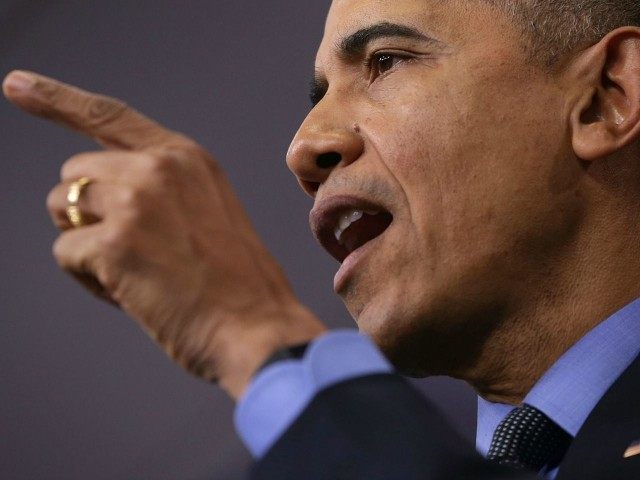On Thursday, President Obama signed off on tougher sanctions against North Korea, as punishment for the Communist regime’s recent nuclear detonation, missile test disguised as a satellite launch, and involvement in cyber-espionage.
CNN notes that Congress passed the sanctions bill by overwhelming margins early this month, including votes in favor from both of the Republican senators running for president, Ted Cruz and Marco Rubio.
CNN somehow forgot to mention that the other senator in the race, Bernie Sanders, skipped the vote, one of only four senators to do so, even though he claims to be deeply concerned about North Korea.
Tougher sanctions are also supported by South Korea and have been upheld by the U.N. Security Council, despite opposition from China and Russia.
“As the situation on the Korean peninsula remains complex and sensitive, all relevant parties should keep calm and restrained, and refrain from doing anything that could escalate tensions. We think it is impossible to resolve any hotspot issues through simple sanctions or pressuring,” said a spokesman for the Chinese Foreign Ministry, as quoted by CNN.
The BBC notes China’s concerns that tougher sanctions could cripple North Korea’s economy.
Russia has declared opposition to unilateral sanctions against North Korea. “Pressuring any countries by imposing unilateral sanctions on them for political purposes is illegal. We recognize only sanctions imposed by UN Security Council,” said Russian Foreign Ministry spokeswoman Maria Zakharova on Thursday, as reported by the Korea Times.
According to the BBC’s account, the new sanctions will “freeze the assets of anyone doing business related to North Korea’s nuclear or weapons programme or involved in human rights abuses,” as well as allocating $50 million for “humanitarian programs” and “radio broadcasts into North Korea.”
Observing that Chinese intransigence is the only reason the U.N. has not punished Pyongyang with tougher sanctions for defying its resolutions, and that China’s willingness to support North Korea with a trade deficit is one of the major reasons they have any sort of functional economy at all, Anders Corr at Forbes last week suggested the U.S. should consider sanctions against China as well.
“The U.S. should immediately impose tough economic sanctions on any entity, including Chinese individuals and state-owned enterprises, that illegally does business with North Korea,” Corr advised. “But we should go further. Until China stops claiming international waters and the territory of its smaller neighbors, halts its cyberattacks on U.S. companies and government agencies, and ceases enabling North Korea’s nuclear proliferation, Congress should enact targeted economic sanctions and travel bans on Chinese military, government, and financial officials and organizations most responsible for the region’s destabilization and cyberattacks on the U.S.”
On Friday, Eric Talmadge of the Associated Press voiced skepticism that the new U.S. sanctions against North Korea would do much to deter their nuclear ambitions.
“Few countries have endured sanctions as deep and longstanding as the Democratic People’s Republic of Korea. But somehow life goes on,” Talmadge wrote, quoting North Korea’s state-run media defiantly insisting they have been “exposed to all kinds of sanctions and blockades for decades,” without shaking the regime’s political will.
Talmadge observed that sanctions have caused problems for North Korea, but the impoverished subjects of the Kim regime have grown accustomed to hardship, while rich and well-connected elites can still get everything they really want, at only modestly inflated prices. Despite years of sanctions, the upscale districts of Pyongyang are not terribly different from Seoul.
Like Corr, Talmadge describes China’s role in helping the North Korean elites evade the brunt of sanctions, and predicts little will change as long as Beijing supports and protects its hideous client, unless the first stirrings of entrepreneurship and a North Korean middle class develop into a real push for change from within, and the regime doesn’t decide to stifle it with bullets. He invests great hope in dictator Kim Jong-un announcing significant reforms at the upcoming Party conference in May.
It remains to be seen how North Korea’s provocations, and the international response to them, shapes that first-in-a-generation Party conference. For the moment, Kim Jong-un seems determined to continue his “space program,” lauding the scientists involved as the “best patriots and admirable heroes.”
“Conquering space is… a fierce class struggle against the hostile forces seeking to usurp our peace and sovereignty,” Kim said in a speech on February 7, as reported by the UK Daily Mail. He declared that the “advance toward space,” using rockets that look suspiciously like intercontinental ballistic missiles, is North Korea’s “strategic goal.”

COMMENTS
Please let us know if you're having issues with commenting.